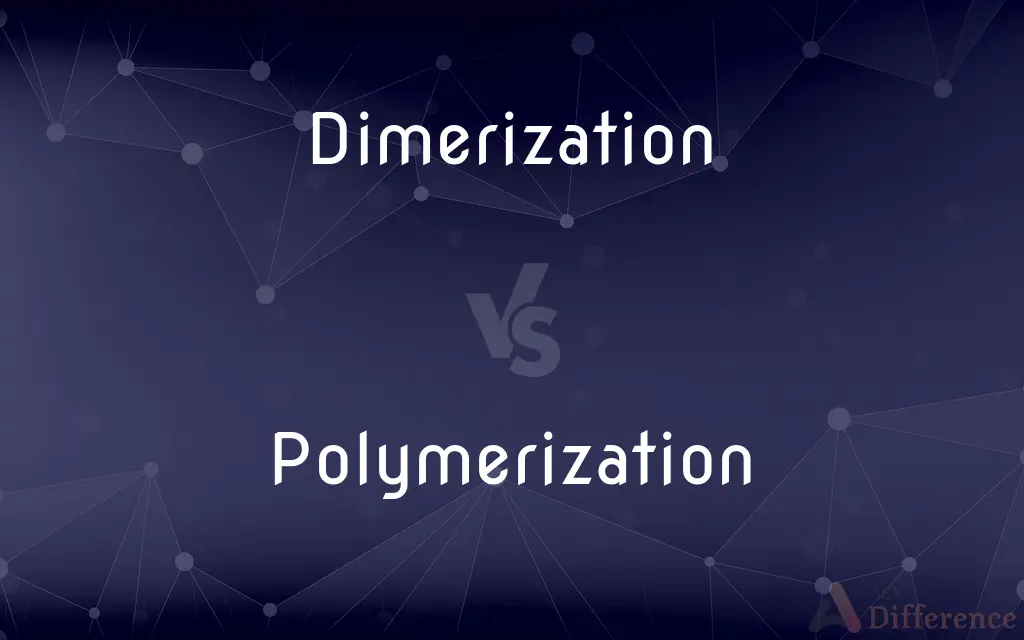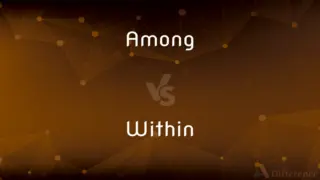Dimerization vs. Polymerization — What's the Difference?
Edited by Tayyaba Rehman — By Fiza Rafique — Updated on September 28, 2023
Dimerization is the chemical process where two molecules combine to form a single dimer, while Polymerization involves the joining of many small molecules to form a larger polymer.

Difference Between Dimerization and Polymerization
Table of Contents
ADVERTISEMENT
Key Differences
At its core, Dimerization and Polymerization represent chemical processes that involve the union of smaller molecules to form more complex structures. Dimerization, as the name suggests, focuses primarily on the coupling of two identical or different molecules to give a single dimeric unit. This process might occur in many organic reactions, where two similar compounds bond to enhance stability. In contrast, Polymerization is a more extensive process. It involves the sequential joining of numerous small molecules, known as monomers, to form a more massive polymer chain or network. This is the foundational principle for the creation of plastics, rubbers, and various synthetic materials.
In understanding Dimerization, one can view it as a specific subtype of Polymerization. After all, when only two molecules combine in a polymerizing reaction, it's Dimerization. This process can be spontaneous, often driven by conditions that favor the stabilization offered by dimer formation. However, Polymerization often requires specific conditions or catalysts, given its complexity. The resulting polymers can be linear, branched, or cross-linked, depending on the nature of the monomers and the polymerization method.
Dimerization often happens in nature, especially in biological systems. For instance, some proteins might dimerize to become functionally active. On the other hand, Polymerization is both a natural and synthetic phenomenon. While nature polymerizes monomers to produce substances like proteins and DNA, humans have harnessed Polymerization to produce materials with specific desired properties.
Comparison Chart
Definition
Combination of two molecules
Joining of many small molecules
Resultant structure
Dimer
Polymer
ADVERTISEMENT
Number of starting molecules
Two
Many
Occurrence
Often natural, especially in biological systems
Natural and synthetic, e.g., in making plastics
Complexity
Simpler process
More complex, with potential for varied structures
Compare with Definitions
Dimerization
The union of two identical or different molecules
Certain proteins require Dimerization to function correctly
Polymerization
The chemical process forming a polymer from monomers.
The Polymerization of ethylene results in polyethylene, a common plastic.
Dimerization
The chemical process forming a dimer
Upon exposure to light, the compound underwent Dimerization
Polymerization
Joining monomers to produce materials with specific properties.
The Polymerization process determines the plastic's flexibility and strength.
Dimerization
The stabilization achieved by pairing two molecules
Dimerization often provides increased stability to volatile compounds
Polymerization
Converting small molecules into complex chains or networks.
Rubber production involves the Polymerization of isoprene.
Dimerization
Combining two like entities into a singular unit
Dimerization of the reagents improved the reaction's efficiency
Polymerization
Sequential addition leading to extensive molecular chains.
Polymerization of styrene gives polystyrene, used in packaging and insulation.
Dimerization
The transformation from monomers to dimers
The solution showed signs of Dimerization under the microscope
Polymerization
The creation of macromolecules from repeated smaller units.
DNA synthesis can be viewed as a form of Polymerization.
Dimerization
(chemistry) Any chemical reaction in which two monomers react to form a dimer.
Polymerization
In polymer chemistry, polymerization (American English), or polymerisation (British English), is a process of reacting monomer molecules together in a chemical reaction to form polymer chains or three-dimensional networks. There are many forms of polymerization and different systems exist to categorize them.
Polymerization
The bonding of two or more monomers to form a polymer.
Polymerization
A chemical process that effects this bonding.
Polymerization
(chemistry) The chemical process, normally with the aid of a catalyst, to form a polymer by bonding together multiple identical units (monomers).
Polymerization
The act or process of changing to a polymeric form; the condition resulting from such change.
Polymerization
A chemical process that combines several monomers to form a polymer or polymeric compound
Common Curiosities
What is Dimerization?
Dimerization is the chemical process where two molecules combine to form a dimer.
Why do some molecules undergo Dimerization?
Molecules might dimerize to enhance stability or achieve a functionally active state.
How are the structures formed through Polymerization?
They can be linear, branched, or cross-linked, depending on the monomers and the method.
Can Dimerization occur in biological systems?
Yes, certain proteins, for instance, might dimerize to become functionally active.
Can Dimerization be considered a type of Polymerization?
Yes, Dimerization can be viewed as a specific, simpler subtype of Polymerization.
Where is Polymerization commonly used?
Polymerization is harnessed in the production of plastics, rubbers, and various synthetic materials.
What's a practical example of Polymerization?
The creation of polyethylene from ethylene is a practical example of Polymerization.
How is Polymerization different from Dimerization?
While Dimerization involves the union of two molecules, Polymerization joins many monomers to create a polymer.
What drives the Polymerization process?
Polymerization often requires specific conditions or catalysts due to its complexity.
Is Dimerization always a simple process?
While Dimerization is generally simpler than extensive Polymerization, the specifics can vary based on the molecules.
Can both Dimerization and Polymerization be reversed?
It depends on the conditions and the molecules, but some processes are reversible while others are not.
What are the products of Polymerization?
Polymerization produces polymers, which can be linear, branched, or cross-linked structures.
Are there specific conditions for Dimerization?
Dimerization can be spontaneous or might require specific conditions, depending on the molecules involved.
Is Dimerization unique to chemistry?
While often discussed in chemistry, Dimerization also plays roles in biology, especially with proteins.
Share Your Discovery

Previous Comparison
Dirge vs. Requiem
Next Comparison
Among vs. WithinAuthor Spotlight
Written by
Fiza RafiqueFiza Rafique is a skilled content writer at AskDifference.com, where she meticulously refines and enhances written pieces. Drawing from her vast editorial expertise, Fiza ensures clarity, accuracy, and precision in every article. Passionate about language, she continually seeks to elevate the quality of content for readers worldwide.
Edited by
Tayyaba RehmanTayyaba Rehman is a distinguished writer, currently serving as a primary contributor to askdifference.com. As a researcher in semantics and etymology, Tayyaba's passion for the complexity of languages and their distinctions has found a perfect home on the platform. Tayyaba delves into the intricacies of language, distinguishing between commonly confused words and phrases, thereby providing clarity for readers worldwide.
















































